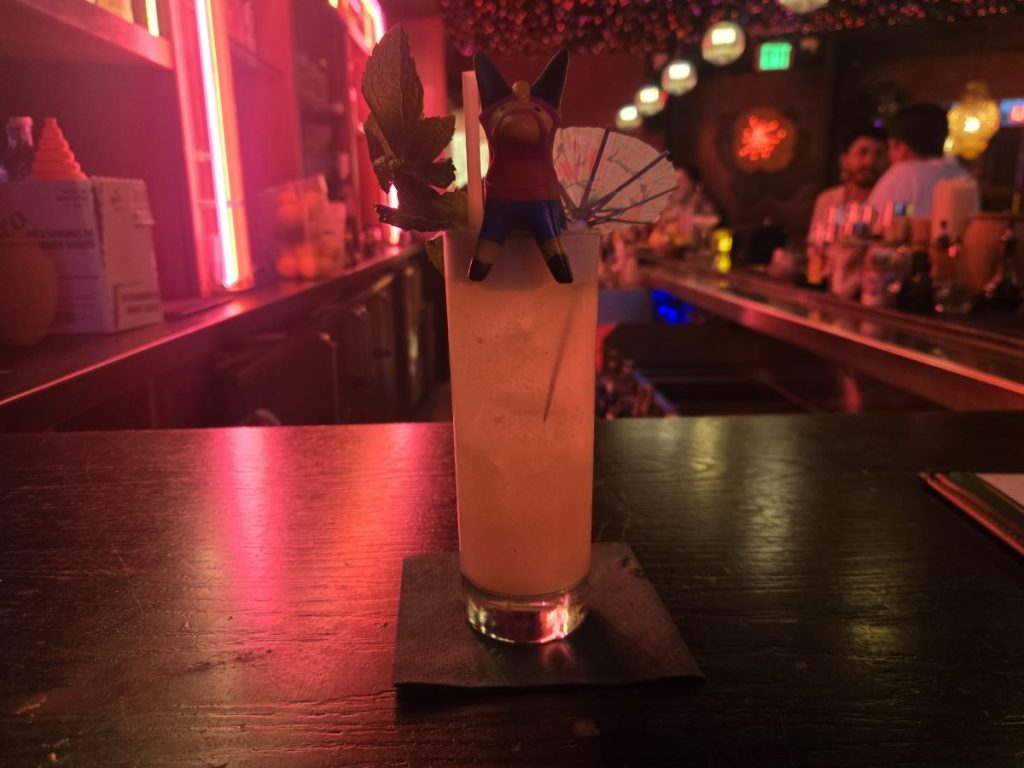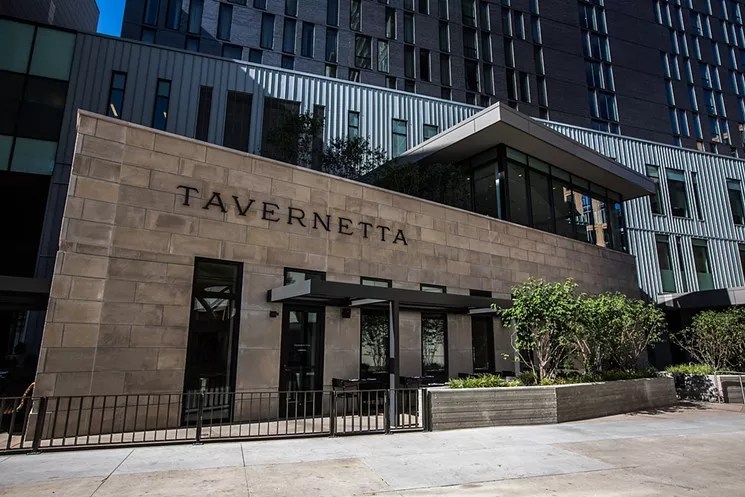
Stephan Werk, Werk Creative

Audio By Carbonatix
“It’s all still so fresh, but it’s such a bummer. I ripped the stickers off of all this when we opened, and now, we’ve got to close it down,” says Liz Samioglou, general manager of Ghost Donkey. The mezcal-centric speakeasy that opened along the train tracks in the Coloradon behind Union Station in 2021 is closing its doors on October 19.
The Omaha-based chain has cited dwindling sales as the reason it’s calling it quits at 1750 Wewatta Street. Ghost Donkey ownership is split between two companies; the Denver location is owned by Flagship Restaurant Group, which also owns Blue Sushi Sake Grill just a few blocks away on 16th and Wazee. The company has extended employment opportunities at Blue Sushi to the Denver Ghost Donkey team.
Samioglou has been with Ghost Donkey since opening day. “They really are taking care of us,” she notes of the owners. “They told us two weeks in advance, which nowadays, you usually don’t even get that.”
When Ghost Donkey opened in 2021, mezcal was still trying to break into the mainstream, though the city already had bars specializing in the agave spirit, including La Doña Mezcaleria at 13 East Louisiana Avenue and Littleton’s Palenque Cocina y Agaveria. Four years later, Denver is home to even more acclaimed mezcalerias, including Michelin Bib Gourmand eatery La Diabla and the Michelin-starred Mezcalaria Alma. La Diabla owner Jose Avila just debuted another mezcal-centric spot, Malinche Audio Bar, on October 13.
The increased competition may be a factor in Ghost Donkey’s drop in sales, which have plummeted from $10,000 a night to just over $800. Though management says that those experiencing homelessness in the area were rarely a problem inside, it was almost impossible to use the patio due to people camping and tagging the furniture out there.

M.G. Marini
The area behind Union Station has been tough for both small businesses and chains since the pandemic. RTD has taken action to address the homeless crisis in the area, creating an outreach program in 2022 and adding to its own police force. However, it also took some controversial approaches, like fencing off three public community areas for four years, jackhammering away a series of benches next to Wewatta Pavilion, and removing the wooden bench in front of the “Peaks of the Rockies” wooden mural on the back of the platform, as well as permanently closing stairway and elevator access points.
In some ways, RTD is on the right track. The homeless population in the neighborhood has dropped significantly, and according to RTD, there has been “a nearly 60 percent reduction in security-related calls and a three-year decrease in reports of criminal activities between 2022 and 2025 at Denver Union Station.” But there are still struggles. In 2022, Amalgamated Transit Union Local 1001 president Lance Logenbohn called the area behind Union Station a “lawless hellhole,” a reputation the neighborhood is still trying to shake years later.

Danielle Lirette
Only a handful of businesses behind Union Station have been there since before the pandemic, including Tavernetta and its sister concept, Sunday Vinyl, along with CVS, Whole Foods, The Pig & The Sprout, Kaffe Landskap and Tupelo Honey, which is eight-and-a-half years into its ten-year lease. But they’ve weathered major challenges; in 2020, for example, a man with a rifle barricaded himself inside the Pig & The Sprout during dinner service.
Recently, some entrepreneurs who have found success in other parts of Colorado tried their luck on Wewatta Street, only to close not long after. The Troy Guard-backed Eggs Inc. shuttered after only seven months. Blue Fish, a hit in Breckenridge, opened a second location at 1601 Wewatta; it closed after only four months. That address has experienced substantial retail turbulence over the last decade, having also housed Public School 303, Wewatta Point and the Daily Grill.
Other buildings on the street have seen similar switches, such as the one housing Hotel Indigo, which has changed its restaurant concept three times in the past five years. It’s currently home to Ambler.
Some of the retail spaces in the neighborhood have never even had a tenant. One on the corner of 17th and Chestnut streets has been empty since the building’s completion in 2015. Another at 16th and Chestnut has been vacant since 2009. And two weeks ago, the area’s Starbucks shuttered.
Not everyone in the neighborhood has given up hope, however. Greg, a Jehovah’s Witness volunteer who has stood on Wewatta Pavilion daily since the pandemic, expresses optimism. “I don’t feel any less safe,” he notes. “I see an increase in police presence, too. I take the train in every day. When I first started to take it, I was the only person on the train. Now, it’s full of people coming down for sporting events or kids trying to enjoy the nightlife. My daughter even takes it.”
Time will tell what the future holds for the Union Station neighborhood. In the meantime, we’ll be grabbing one more cocktail at Ghost Donkey before it kicks off into the night for good.
Ghost Donkey is located at 1750 Wewatta Street and will be open from 4 p.m. to midnight Sunday through Wednesday, 4 p.m. to 2 a.m. Thursday and Friday, and 3 p.m. to 2 a.m. Saturday until October 19. For more information, visit ghostdonkey.me.